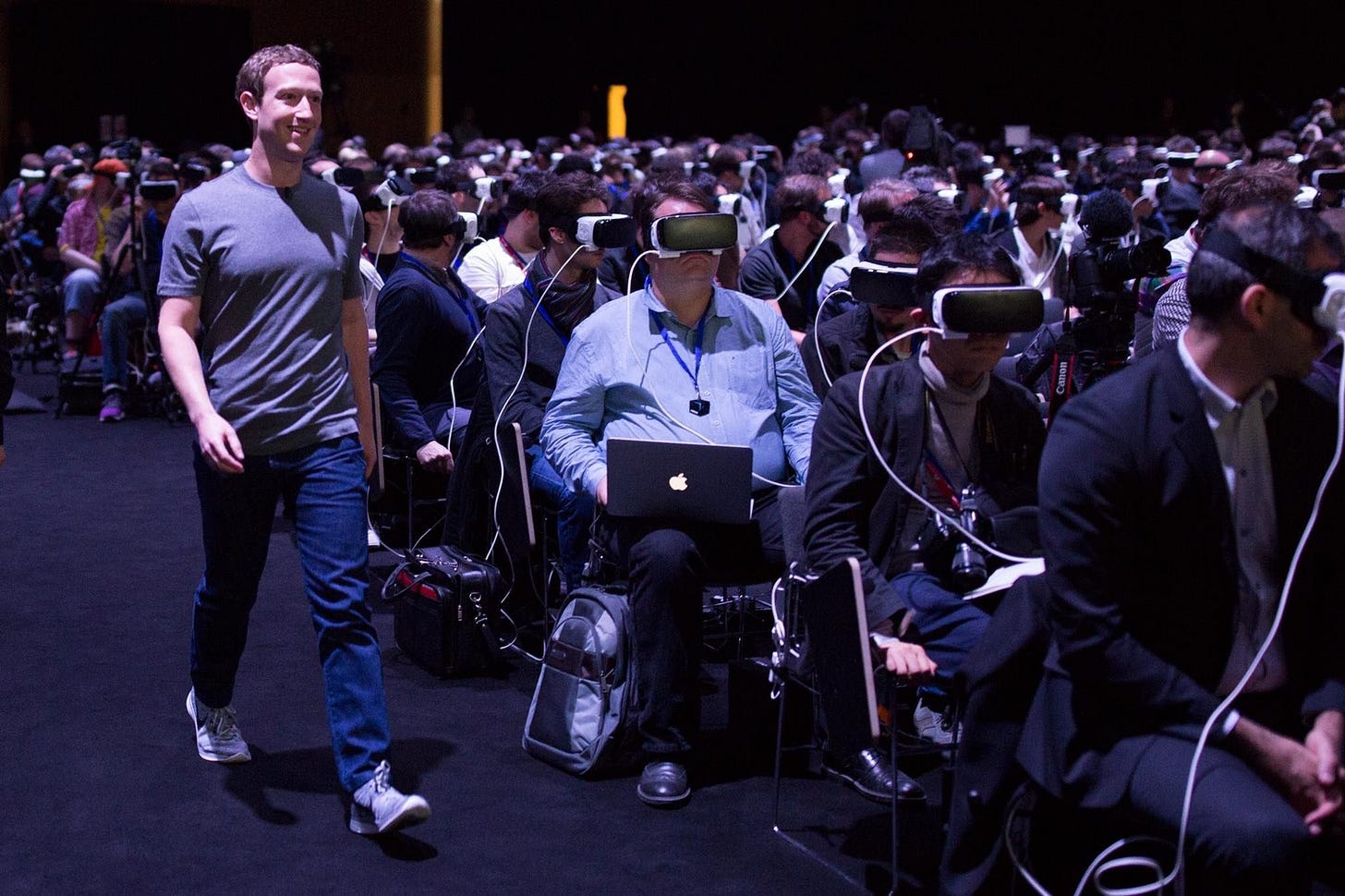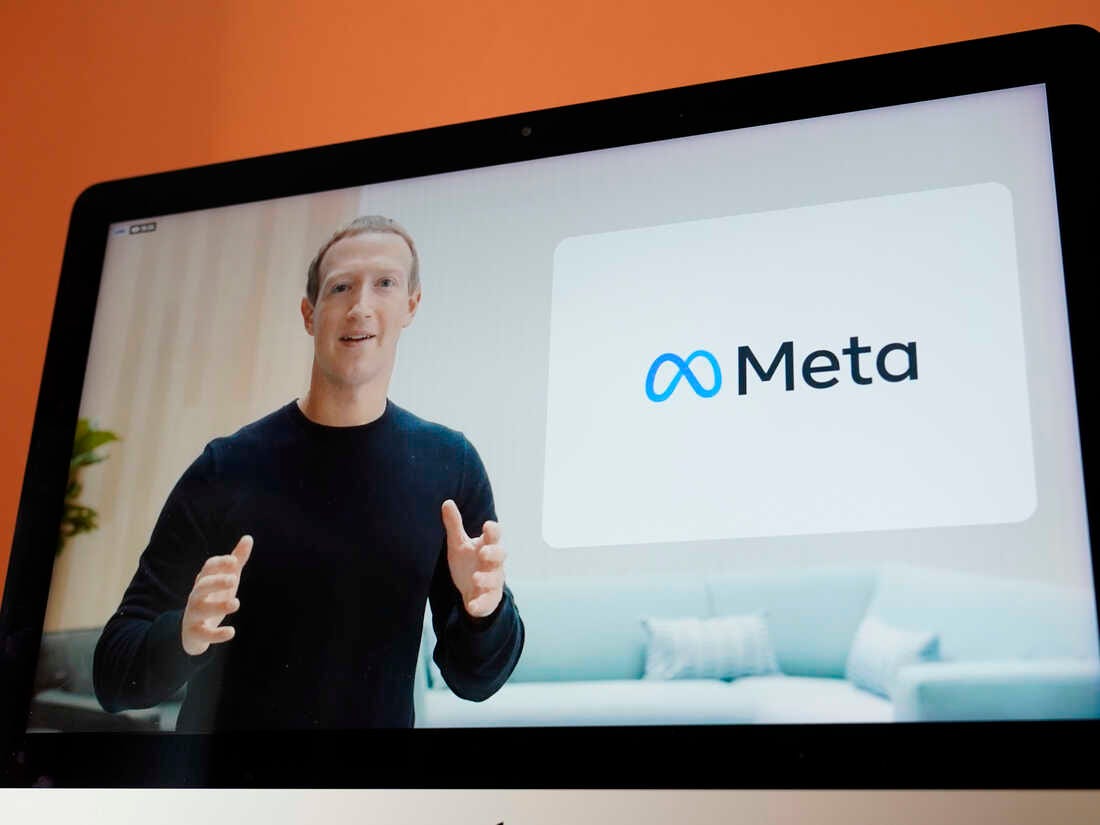Meta is for Losers
Mark Zuckerberg is betting his company on a new idea—but this is a wager he will almost certainly regret
Unless you live in a cave far beyond the reach of social media, you must have heard that Facebook is changing its name to Meta. What’s harder to understand is why. Or what it means for the platform’s 3 billion users.
True, companies often change their name, but—as I’ve written elsewhere—rebrandings of this sort frequently have unintended consequences, even destructive ones. And what Zuckerberg did is especially risky. He’s giving a hitherto successful company the name of an unproven project: Meta, his futuristic dream of creating a metaverse, a kind of immersive alternative reality for web users.
The Honest Broker is a reader-supported guide to books, music, and culture. Both free and paid subscriptions are available. If you want to support my work, the best way is by taking out a paid subscription.
The usual approach is to make sure an idea works before changing the company’s name. Zuckerberg’s lack of caution in this regard is tantamount to betting the business on his pet project.
Not even Steve Jobs dared to do that. Jobs loved the Lisa and Mac computers, but he never considered changing his company’s name to Lisa. Or, in later years, to iPod or iPhone. Bill Gates had high hopes for Clippy the Paperclip, but he never abandoned the name Microsoft. Zuckerberg’s move is literally a career-defining moment for him. Ten years from now, this unexpected decision will either be viewed as a brilliant visionary leap of faith—or else, as a ridiculous incident when a founder’s ego and hubris got out of control..
Consumers have seen those downfalls before. They remember John DeLorean promising to create the coolest car in history, instead ending up bankrupt and in court defending himself against cocaine trafficking charges. They know about Coca-Cola launching its “New Coke” with such a big publicity blitz that 80% of consumers heard about it within days. . . and started protesting with so much anger that the company’s own bottlers launched a lawsuit. And there are still a few people alive who remember Ford’s fiasco with the Edsel car.
“Instead of entering the gritty, exciting world of Blade Runner, you’re trapped inside a bad episode of Family Guy.”
Is Zuckerberg risking a similar fate?
I admire his boldness, but I think he is making the wrong bet here. I’m not saying that the metaverse will be a total failure—in fact, I can imagine some consumers embracing it with enthusiasm. But these won’t be the cool kids who wear the hottest new fashions and buy the trendiest new gadgets.
Instead, the Metaverse will almost certainly become associated with losers. I’m not surprised that the jokes started within minutes of Zuckerberg announcing the change.
I’m not a technophobe, and I understand the appeal of new consumer products and services. I remember the first time I heard a car GPS system giving voice directions to a driver—I was visiting Germany and my wealthy host was showing off the capabilities of his new Mercedes. I was floored when a female voice came out of nowhere and started telling him the best route. I even asked him to make a wrong turn, just to see what would happen. I had other moments of wonder encountering a compact disc player for the first time back in 1983 or buying my first book on the Internet in 1997 or getting my first iPhone in 2009.
But Meta isn’t like those technologies. There’s something strange and unnatural about living in the Matrix, and there’s a good reason why alternative realities have been prominent in so many dystopian science fiction films. When you see these movies, you feel pity for the people who live plugged into their fake world. No matter how realistic the metaverse, you will never completely overcome that sense of pity and aversion.
I’m reminded of the story of the person in the tank, which was part of my philosophy studies in grad school. This was a thought experiment in which we imagined a person floating in a tank, hooked up with various wires to high tech equipment. The equipment jolted parts of the test subject’s brain, which experienced all sorts of amazing things in response. But they weren’t real; they were bogus experiences created by brain stimulation.
The question for debate in the philosophy tutorial was: would you want to be the person in the tank. It didn’t take long for us to answer. No matter how fun or pleasurable those brain jolts might be, we all decided we would take our chances with reality instead.
Now Mark Zuckerberg wants to transform each of his customers into that person in the tank. He offers us a entry point into a fake world, but an alluring one—almost certainly neater and better organized than our own messy lives.
Will people take the bait?
Certainly a few will. Or maybe even a lot. But they won’t be elite trendsetters and fashionable influencers. They will be nerds and incels and the most disgruntled members of society, each desperate for escape.
And users will look creepy too. You need to lock yourself into a headset to get the full benefit of the metaverse—and there’s no way that Zuckerberg can make that look cool. The people who spend hour after hour in his metaverse will be the subject of jokes and mockery.
And that will create a vicious circle, making these Matrix-ites even more obsessed with hiding from a real world that mocks them. I hate to say it, but I can already anticipate stories about drug addiction and suicide correleated with metaverse immersion.
It doesn’t help that the interface looks goofy and cartoonish. Instead of entering the gritty, exciting world of Blade Runner, you’re trapped inside a bad episode of Family Guy.
That said, I always ask myself what conditions might prove me wrong. And in this instance I do believe that an alternative reality constructed with boldness and rule-breaking creative freedom could be attractive, maybe even life-changing. But. . .
But Facebook isn’t the kind of company that could ever create an experience of that sort. Facebook is associated with conventionality. It’s where you go to keep up with your grandparents and friends from school. It’s a place famous for snarkiness, censorship, whistleblowers, surveillance capitalism, and annoying advertising. All of those will inevitably enter into Zuckerberg’s metaverse.
If you want a metaverse that really rocks the casbah, it won’t come from a $300 billion Silicon Valley megacorporation. Instead of Mark Zuckerberg, it would need a Satoshi Nakamoto or a Neal Stephenson or a Slavoj Žižek or a William Gibson to create its blueprint. Or even better, it ought to be crowdsourced, constructed by hackers and rebels who would laugh at everything Facebook stands for.
In other words, Meta will fall short for the same reason that IBM didn’t grasp the possibilities of the Internet and General Motors sat and watched Tesla lead the new automotive revolution. Zuckerberg is creating something in his own image—and that’s a ‘personal brand’ getting more tarnished with each passing month. As we all know, there’s trouble brewing at Facebook—or Meta or whatever you want to call this behemoth of the web. And it’s a big mess that no clunky virtual reality headset can even begin to fix.









Plus, you didn't mention that the Metaverse will almost instantly be taken over by next-level hardcore porn.
On point. The killer app of VR is immersive edginess. So censorship and surveillance capitalism will make for a dull af virtual reality. I do not see Instagram influencers migrating to Meta's VR regardless of any payment structure or functionality.
Everyone knows Meta is a direct reflection of Mark Zuckerberg's thinking, just like Facebook itself is. We all know his thinking is seriously damaged. So why would we want to immerse ourselves further? We already swim in his reality and it is garbage dope rat surveillance capitalism ... There's just not a viable successor just yet. But it's no wonder kids flee to Bytedance - Zuck is literally less cool than the Chinese Communist Party lol